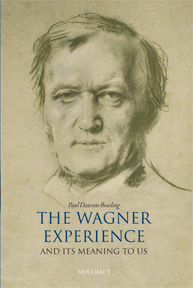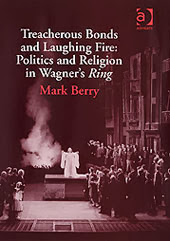"Yet in some respects this audience gets what it deserves. They (we) are a strikingly complicit bunch of fatcats. They watch themselves and their prosperity being viciously satirised; they witness every value they hold dear being perverted; they hear some of their finest masterpieces being used as a vehicle for guilt-ridden dissociation from their past and their present: and they cheer."
"The denial of sensual charm is in fact a recurrent phenomenon of these stagings. Wherever the drama requires beauty or splendour, ugliness and degradation are the predictable response: Venus (in Tannhäuser) as a fat, pregnant housewife in silver lamé, her naiads as hairy Neanderthals with bare bottoms"
"As for the solo castings, one is mildly conscious that this is not where the (heavily subsidised) big money is being spent....A number of singers struggled to cope with the huge stage and auditorium, even with the orchestra canopied, which, for top Wagnerians, has usually solved the problem of balance. In many opera houses, some of these voices would scarcely be heard at all"
Stephen Walsh over at "The Arts Desk" discusses the "New", New Bayreuth style.
theartsdesk in Bayreuth: Wagner in the Laboratory

Richard Wagner has probably only himself to blame if his operas have become a laboratory for the testing-to-destruction of the intellectual preoccupations of that Opera-Führer of our time, the stage director. Wagner it was, after all, who transferred the mythic concept of concealed meaning to the opera house: Wagner who recreated legend as psycho-social allegory, and made musical narrative the handmaiden of philosophy and political ideology. What he would have thought of the latest manifestation of these processes in the staging of his works in the opera house he built at Bayreuth is a good question.
Not much, I should like to think – but I’m by no means entirely confident. Some case studies from the 2011 festival. In Hans Neuenfels’s production of Lohengrin(the tale of a young girl wrongly accused of murdering her brother, who marries her champion but fails the test of not asking his identity), the Brabantian and Saxon nobles, ladies etc. are mainly presented as a chorus-line of black, white, pink and yellow rats, because – Neuenfels explains – it’s necessary to disrupt the smooth heraldic surface of the medieval setting with something that “outdoes the bizarre.”
'The minute you enter a theatre in Germany the past starts buzzing round you like an angry hornet'
In Die Meistersinger von Nürnberg
Katharina Wagner, the composer’s great-granddaughter and now co-director of the festival, portrays the Masters in the final act procession as a line-up of hideously masked German geniuses (including Wagner himself) in boxing shorts and with exposed erect penises.
In Act II of Tristan und Isolde, on the other hand, the erotic lovers are the sort of tidy middle-aged couple you might meet on an American tour-bus, and their nocturnal love-play is conducted on a pair of yellow stools in what looks (and feels) like a well-lit Soviet sports hall (the lovers pictured left by Enrico Nawrath).
The Minstrels' Hall in
Tannhäuser is reimagined by Sebastian Baumgarten as a biogas recycling plant alias (of course) an extermination camp, and Venus – doing her own bit of recycling – pops up at the end with a nice middle-class baby.

Finally Parsifal, Wagner’s complex allegory of Christian suffering and redemption, is used by Stefan Herheim as a platform for a broad re-enacting of German history over the last 100 years, interwoven with the story of Bayreuth itself and coloured in with some lurid speculations about Parsifal’s relationship with his mother and Kundry’s relationship with pretty well everyone. There’s an uncanonical baby here, too; we (perhaps) witness its conception, attend its birth and observe its abduction (by Kundry in the unexpected guise of a housemaid). But exactly why it’s there at all remains something of a mystery.
One has to keep reminding oneself, through all these fantasies, that
Wagner was also the apostle of the intimate relationship between music and text: that the idea of the integrated art-work lay at the heart of the revolution he saw himself as carrying through in opera. As Patrick Carnegy pointed out in his Wagner and the Art of the Theatre, this needn’t be taken to mean that he would have been hostile (as his widow, Cosima, certainly was) to any new ideas as to how his works might be staged after his death.
But one would like to feel that he would have jibbed at this wholesale deconstruction of his plots, even if – as far as I can judge – Bayreuth continues to perform his music and (with the odd exception) his words in exemplary fashion. In fact, the authenticity of what one hears if anything draws attention to the perversity of what one sees. I’ll come back to the quality of what one hears a little later. I suspect there’s a connection here, but it’s a pragmatic rather than a philosophical one.
'The Wagners are like the drop-out heir to a stately home who justifies keeping it by converting it into a drug dependency unit'
One can go on about Director’s Theatre, but Bayreuth is a very special case. You can travel around in Germany and not be aware of anything particularly odd about its past. But the minute you enter a theatre the past starts buzzing round you like an angry hornet. This will be Germany’s past. But at Bayreuth, Germany’s past is hopelessly entangled with its own. No need to dwell on all this:
Winifred Wagner’s involvement with Hitler, the implications this had for the works themselves, the post-war recriminations, the interminable Wolfgang Wagner régime, the family battles over his successor.

These battles, I suppose, are still going on. They’re reflected, surely, in the flailing, sophomoric imagery of the 33-year-old Katharina’s Meistersinger (Act 3 pictured above right by Enrico Nawrath) and in the fact that, as is rumoured, she has subsequently been under pressure to restrict herself to managerial activities. But every one of these productions reflects, in one way or another, the seemingly unassuageable Bayreuth angst. In a nutshell, the past has not gone away, perhaps will never go away, and must be eternally and unconditionally fought.
Yet for a house dedicated to the perpetuation of a single composer’s works, this is an impossible, self-contradictory proposition. The Wagners are like the drop-out heir to a stately home who justifies keeping it by converting it into a drug dependency unit and letting the park off for raves.
Continue Reading at theartsdesk























































